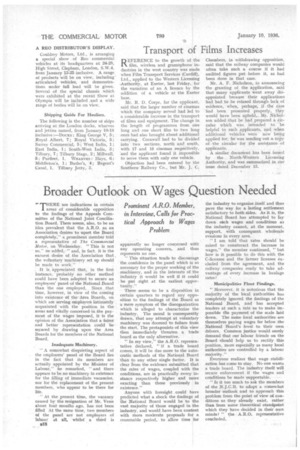Broader Outlook on Wages Question Needed
Page 36

If you've noticed an error in this article please click here to report it so we can fix it.
Prominent A.R.O. Member, in Interview, Calls for Practical Approach to Wages Problem
" HERE are indications in certain
I areas Of considerable opposition to the findings of the Appeals Committee of the National Joint Conciliation Board. There seems, also, to be an idea prevalent that the A.R.O. as an Association, desires to upset the Board completely," a prominent member told a representative of The Commercial Motor, on Wednesday. "This is not
so," he added, and, in fact; it is the earliest .desire of the Association that. the voluntary machinery get up should be made to work."
, It isfappreciated that, in the first instance, probably no other method could have been adopted to secure an employers' panel of the National Board than the one employed. Since that time, however, in view of the coming into existence • of the -Area Boards, on which are serving eariployerS Intimately acquainted with the position in the areas and vitally concerned in the payment of the wages imposed, it is the opinion of the Association that a fairer and better representation could be secured by drawing upon the . Area Boards for the members of the National Board,
Inadequate Machinery.
" A somewhat disquieting aspect of the employers' panel of the Board lies in the fact that its members are actually appointed by the Minister of Labour," he remarked, " and there appears to be no machinery in existence for the filling of immediate vacancies, nor for the replacement of the present members, who appear to he there for life.
" At the present time, the vacancy caused by the resignation of Mr. Venn about four months ago, has not been filled At the same time,. two tnernbers of the panel are not employers of labour at all, whilst a third is apparently no longer concerned with any operating concern, and thus represents no one.
" This situation tends to discourage the confidence in the panel which is so necessary for the proper working of the machinery, and in the interests of the industry it would be well if it could be put .right at the earliest opportunity.'' There seems to be a disposition in certain quarters to regard any opposition to the findings of the Board as a mere symptom of the disorganization which is alleged to characterize the industry. The moral is consequently drawn, that any attempt at voluntary machinery was doomed to failure from the start. The protagonists of this view then immediately threaten a trade board as the only alternative.
"In my view," the A.R.O. representative declared, " if a trade board comes, it will be due more to the autocratic methods of the National Board than to any other single factor. It is clear from the evidence submitted that the rates of wages, coupled with the conditions, are in practically every instance respectively higher and more exacting than those previously in existence."
Anyone with foresight . could have predicted what a shock the findings of the National Board would be to the vast majority of those engaged in the industry, and would have been content with more moderate proposals for a reasonable period, to allow time for the industry to organize itself and thus pave the way for a lasting settlement satisfactory to both sides. As it is, the National Board has attempted to fay down such wages and conditions as the industry cannot, at the' moment, support, with consequent wholesale evasions in every area.
" I am told that rates should" be raised to counteract the increase in wages," the member continued,. but how is it possible to do this with the C-licensee and the farmer licensee excluded" from the agreement, and the railway' companies ready to take advantage of every increase in haulage rates?
Municipalities Flout Findings.
" Moreover, it is notorious that the majority of the local authorities has completely ignored the findings of the National Board, and has accepted tenders at such a rate as to make impossible the payment of the scale laid down. The same local authorities are themselves paying wages far below -the National Board's level to their own drivers. Common justice would surely demand that our labour friends on the Board should help us to rectify -this position, more especially as many local authorities are controlled by a labour majority."
Everyone realizes that wage stabilisation has come to stay. No one wants a trade board. The industry itself will secure enforcement if the wages and conditions be made supportable.
" Is it too much to ask the members of the N.J.C.B. to adopt a somewhat broader outlook and to approach this problem from the point of view of conditions as they already exist, rather than from some theoretical standpoint which they have decided in their own minds? " the A.R.O. representative concluded.




































































































